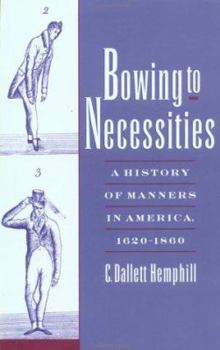Bowing to Necessities: A History of Manners in America, 1620-1860
Select Format
Select Condition 
Book Overview
Anglo-Americans wrestled with some profound cultural contradictions as they shifted from the hierarchical and patriarchal society of the seventeenth-century frontier to the modern and fluid class democracy of the mid-nineteenth century. How could traditional inequality be maintained in the socially leveling environment of the early colonial wilderness? And how could nineteenth-century Americans pretend to be equal in an increasingly unequal society? Bowing to Necessities argues that manners provided ritual solutions to these central cultural problems by allowing Americans to act out--and thus reinforce--power relations just as these relations underwent challenges. Analyzing the many sermons, child-rearing guides, advice books, and etiquette manuals that taught Americans how to behave, this book connects these instructions to individual practices and personal concerns found in contemporary diaries and letters. It also illuminates crucial connections between evolving class, age, and gender relations. A social and cultural history with a unique and fascinating perspective, Hemphill's wide-ranging study offers readers a panorama of America's social customs from colonial times to the Civil War.
Format:Paperback
Language:English
ISBN:0195154088
ISBN13:9780195154085
Release Date:April 2002
Publisher:Oxford University Press
Length:320 Pages
Weight:1.20 lbs.
Dimensions:0.8" x 6.1" x 9.2"
Customer Reviews
1 rating
Accessible, informative, and well written
Published by Thriftbooks.com User , 19 years ago
Along with John F. Kasson's *Rudeness and Civility: Manners in Nineteenth-Century Urban America*, I found this book accessible, informative, sophisticated, and well written. These are the qualities that I look for in reading a book. While we tend to focus on the more obvious, the two books tell us a lot about the not-so-obvious in modern living. Reading etiquette and conduct books after having read these books proved a lot of fun and thoroughly enlightening.





